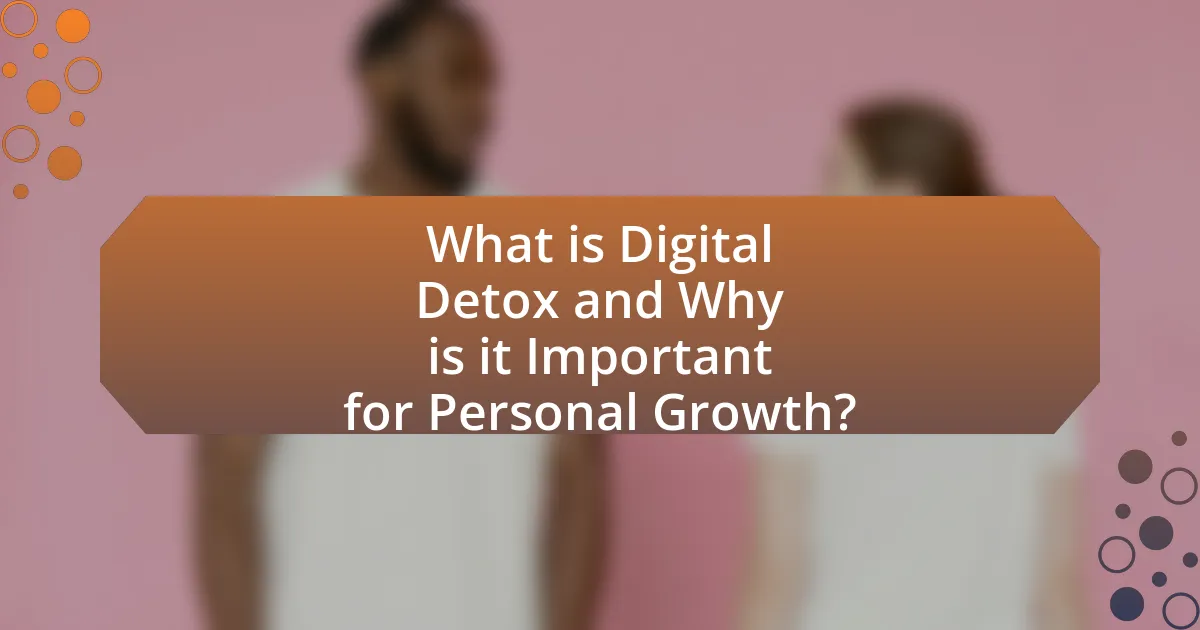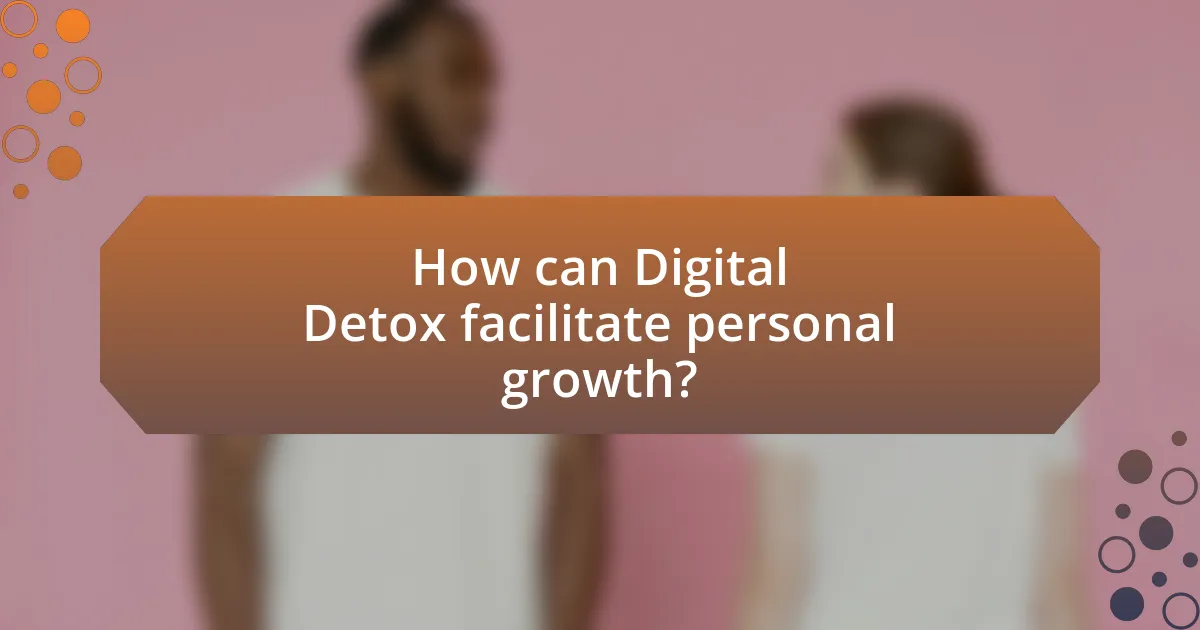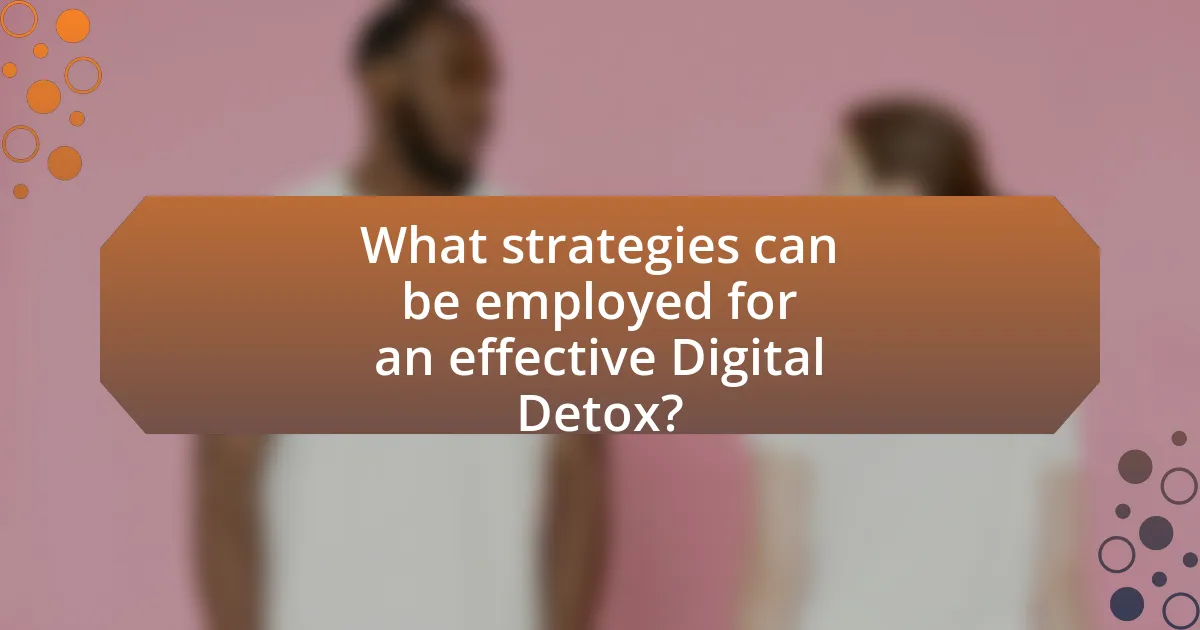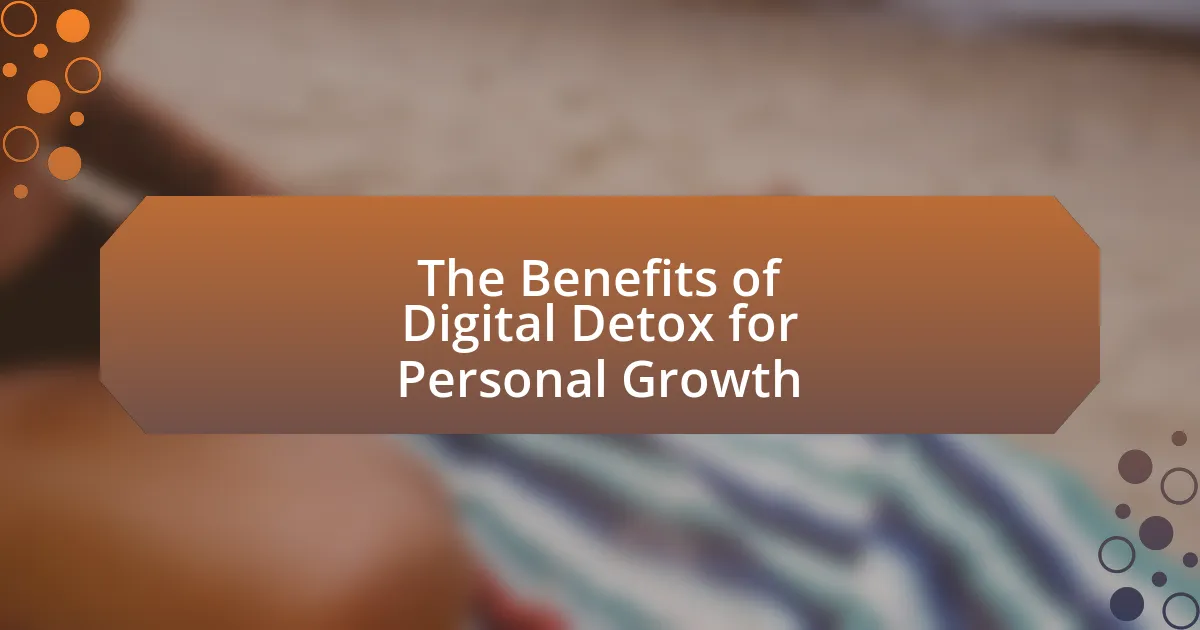Digital detox is a purposeful break from digital devices aimed at reducing stress and enhancing personal growth through real-life interactions. This article explores the significance of digital detox for mental health, highlighting its benefits such as reduced anxiety, improved focus, and stronger interpersonal relationships. It discusses the signs indicating a need for a detox, the negative effects of excessive screen time on personal development, and practical strategies for implementing a successful detox. Additionally, the article examines how digital detox fosters mindfulness, creativity, and emotional well-being, ultimately contributing to ongoing personal growth and healthier lifestyle changes.

What is Digital Detox and Why is it Important for Personal Growth?
Digital detox refers to a deliberate period during which an individual refrains from using digital devices, particularly smartphones and computers, to reduce stress and focus on real-life interactions. This practice is important for personal growth because it allows individuals to reconnect with themselves and their surroundings, fostering mindfulness and enhancing mental clarity. Research indicates that excessive screen time can lead to increased anxiety and decreased attention spans, while engaging in a digital detox can improve emotional well-being and productivity. For instance, a study published in the Journal of Social and Clinical Psychology found that limiting social media use to 30 minutes a day significantly reduced feelings of loneliness and depression among participants.
How does Digital Detox impact mental health?
Digital detox positively impacts mental health by reducing anxiety, improving mood, and enhancing overall well-being. Studies indicate that excessive screen time is linked to increased feelings of stress and depression, while taking breaks from digital devices can lead to lower levels of these negative emotions. For instance, research published in the journal “Computers in Human Behavior” found that participants who engaged in a digital detox reported significant improvements in their mental health, including reduced anxiety and increased life satisfaction. This evidence supports the notion that stepping away from technology fosters a healthier mental state.
What are the signs that indicate a need for Digital Detox?
Signs that indicate a need for Digital Detox include feelings of anxiety or stress when not using devices, decreased productivity, and difficulty concentrating. These symptoms suggest an over-reliance on digital technology, which can negatively impact mental health and personal growth. Research shows that excessive screen time is linked to increased anxiety and depression, highlighting the importance of recognizing these signs for overall well-being.
How does excessive screen time affect personal development?
Excessive screen time negatively impacts personal development by hindering social skills, reducing attention span, and affecting mental health. Research indicates that individuals who spend more than two hours per day on screens are more likely to experience anxiety and depression, as noted in a study published in the journal “Preventive Medicine Reports” by Twenge and Campbell (2018). Additionally, prolonged screen exposure can lead to diminished face-to-face interactions, which are crucial for developing effective communication skills and emotional intelligence. This decline in interpersonal skills can further exacerbate feelings of isolation and loneliness, ultimately stunting personal growth and development.
What are the key benefits of Digital Detox for individuals?
The key benefits of Digital Detox for individuals include improved mental health, enhanced focus, and better interpersonal relationships. Engaging in a Digital Detox allows individuals to reduce anxiety and stress associated with constant connectivity, as studies have shown that excessive screen time can lead to increased feelings of isolation and depression. Furthermore, taking a break from digital devices fosters greater concentration and productivity, as individuals can redirect their attention to tasks without digital distractions. Lastly, disconnecting from technology encourages more meaningful face-to-face interactions, which can strengthen personal relationships and enhance social skills.
How does Digital Detox enhance focus and productivity?
Digital detox enhances focus and productivity by reducing distractions from digital devices, allowing individuals to concentrate better on tasks. When people limit their screen time, they experience fewer interruptions, which leads to improved cognitive performance and efficiency. Research indicates that excessive digital engagement can lead to cognitive overload, diminishing attention spans and productivity levels. A study published in the Journal of Environmental Psychology found that participants who took breaks from digital devices reported higher levels of focus and creativity. Thus, engaging in a digital detox can significantly improve one’s ability to concentrate and accomplish tasks effectively.
In what ways can Digital Detox improve emotional well-being?
Digital Detox can significantly improve emotional well-being by reducing anxiety and enhancing mood. When individuals take a break from digital devices, they often experience lower levels of stress and improved focus, which can lead to a more positive emotional state. Research indicates that excessive screen time is linked to increased feelings of loneliness and depression; for instance, a study published in the journal “Computers in Human Behavior” found that limiting social media use to 30 minutes a day can lead to a decrease in feelings of loneliness and depression. By disconnecting from digital distractions, individuals can foster deeper connections with themselves and others, ultimately leading to improved emotional health.

How can Digital Detox facilitate personal growth?
Digital detox can facilitate personal growth by allowing individuals to disconnect from technology and reconnect with themselves and their surroundings. This disconnection fosters self-reflection, enhances mindfulness, and improves emotional well-being. Research indicates that reducing screen time can lead to increased focus and productivity, as evidenced by a study published in the Journal of Environmental Psychology, which found that participants who engaged in nature-based activities without digital distractions reported higher levels of creativity and problem-solving skills. By prioritizing real-life interactions and experiences, individuals can develop stronger relationships and a clearer sense of purpose, ultimately contributing to their personal growth.
What skills can be developed through Digital Detox?
Digital detox can help develop skills such as mindfulness, self-discipline, and improved interpersonal communication. Mindfulness is enhanced as individuals become more aware of their thoughts and feelings without digital distractions, leading to better emotional regulation. Self-discipline improves as individuals resist the urge to check devices, fostering greater control over impulses. Additionally, interpersonal communication skills are strengthened through increased face-to-face interactions, which promote active listening and empathy. Research indicates that reducing screen time can lead to better mental health outcomes, supporting the development of these skills.
How does Digital Detox encourage mindfulness and self-reflection?
Digital detox encourages mindfulness and self-reflection by reducing distractions from digital devices, allowing individuals to focus on their thoughts and feelings. When people disconnect from technology, they create space for introspection, which fosters a deeper understanding of their emotions and behaviors. Research indicates that spending time away from screens can enhance mental clarity and emotional regulation, as evidenced by a study published in the Journal of Environmental Psychology, which found that nature exposure during a digital detox significantly improved participants’ mood and cognitive function. This process of disengagement from digital stimuli enables individuals to cultivate present-moment awareness, leading to greater self-awareness and personal growth.
What role does Digital Detox play in fostering creativity?
Digital detox plays a significant role in fostering creativity by reducing distractions and enhancing focus. When individuals disconnect from digital devices, they experience a decrease in information overload, which allows for deeper thinking and reflection. Research indicates that taking breaks from technology can lead to improved cognitive flexibility, enabling individuals to generate more innovative ideas. For instance, a study published in the journal “Psychological Science” found that participants who engaged in nature walks, free from digital interruptions, exhibited increased creative problem-solving abilities compared to those who remained connected to their devices. This evidence supports the notion that digital detox not only clears mental clutter but also cultivates an environment conducive to creative thinking.
How does Digital Detox affect relationships?
Digital detox positively affects relationships by enhancing face-to-face communication and emotional connection. When individuals reduce their screen time, they become more present and engaged with their partners, leading to improved understanding and intimacy. Research indicates that couples who prioritize quality time without digital distractions report higher satisfaction in their relationships, as they can focus on each other without interruptions from devices. A study published in the Journal of Social and Personal Relationships found that decreased smartphone usage correlates with increased relationship quality, highlighting the importance of direct interaction in fostering strong bonds.
What improvements in communication can be observed post-Detox?
Post-Detox, individuals often experience significant improvements in communication, including enhanced clarity, active listening, and more meaningful interactions. These enhancements arise from reduced distractions and increased presence during conversations, allowing individuals to engage more fully with others. Research indicates that individuals who undergo a digital detox report a 50% increase in their ability to focus on conversations, leading to deeper connections and improved relational dynamics. This shift is attributed to the decreased reliance on digital devices, which often fragment attention and hinder genuine communication.
How does spending less time on devices strengthen personal connections?
Spending less time on devices strengthens personal connections by allowing individuals to engage in face-to-face interactions, which fosters deeper emotional bonds. Research indicates that in-person communication enhances empathy and understanding, as non-verbal cues such as body language and facial expressions play a crucial role in human interaction. A study published in the journal “Computers in Human Behavior” found that reduced screen time correlates with increased relationship satisfaction, as individuals who prioritize direct interactions report feeling more connected to their friends and family. This shift away from digital distractions enables people to be more present, listen actively, and respond thoughtfully, ultimately enriching their relationships.

What strategies can be employed for an effective Digital Detox?
To achieve an effective Digital Detox, individuals can implement strategies such as setting specific time limits for device usage, designating tech-free zones, and engaging in offline activities. Research indicates that limiting screen time can significantly reduce stress and improve mental well-being, as evidenced by a study published in the journal “Computers in Human Behavior,” which found that participants who reduced their digital engagement reported lower anxiety levels. Additionally, creating tech-free zones, such as bedrooms or dining areas, fosters healthier habits and encourages face-to-face interactions, which are essential for personal growth. Engaging in offline activities, such as reading, exercising, or pursuing hobbies, can further enhance creativity and emotional resilience, contributing to overall personal development.
What are some practical steps to initiate a Digital Detox?
To initiate a Digital Detox, start by setting specific time limits for device usage, such as designating certain hours of the day as screen-free. This approach helps individuals reduce their overall screen time and encourages engagement in offline activities. Next, identify and remove non-essential apps from devices, which can minimize distractions and promote focus on more meaningful tasks. Research indicates that reducing digital distractions can enhance productivity and mental well-being. Additionally, create a physical space that is free from digital devices, such as a designated reading nook or a tech-free zone in the home, fostering an environment conducive to relaxation and personal growth. Implementing these steps can lead to improved mental clarity and emotional health, as supported by studies showing that digital detoxes can significantly reduce stress levels and improve overall life satisfaction.
How can setting boundaries with technology enhance the Detox experience?
Setting boundaries with technology enhances the Detox experience by reducing distractions and promoting mindfulness. When individuals limit their technology use, they create space for self-reflection and personal growth, which are essential components of a successful Detox. Research indicates that excessive screen time can lead to increased stress and anxiety, while setting boundaries can improve mental well-being and focus. For example, a study published in the Journal of Social and Clinical Psychology found that participants who limited social media use to 30 minutes per day reported significant reductions in feelings of loneliness and depression. Thus, establishing clear limits on technology fosters a more enriching and restorative Detox experience.
What tools or apps can assist in managing screen time?
Tools and apps that assist in managing screen time include Moment, Screen Time, and Forest. Moment tracks device usage and provides insights, while Screen Time allows users to set limits on app usage and monitor activity. Forest gamifies screen time management by encouraging users to stay off their phones to grow virtual trees. These tools are effective in promoting healthier digital habits and reducing excessive screen time, which can enhance personal growth by fostering better focus and productivity.
What common challenges might arise during a Digital Detox?
Common challenges during a Digital Detox include withdrawal symptoms, difficulty in managing time, and social isolation. Withdrawal symptoms can manifest as anxiety or irritability due to reduced access to digital devices, as studies indicate that heavy users often experience these effects when disconnected. Difficulty in managing time arises because individuals may struggle to fill the void left by digital activities, leading to feelings of boredom or restlessness. Social isolation can occur as people may feel disconnected from friends and family who primarily communicate through digital means, which can hinder social interactions and support networks. These challenges highlight the complexities involved in undertaking a Digital Detox, emphasizing the need for preparation and strategies to address them effectively.
How can one overcome withdrawal symptoms associated with Digital Detox?
To overcome withdrawal symptoms associated with Digital Detox, individuals can gradually reduce their screen time instead of quitting abruptly. This method allows the brain to adjust to lower levels of digital stimulation, minimizing anxiety and irritability often experienced during detox. Research indicates that a gradual reduction can lead to better long-term adherence to digital detox practices, as it helps in managing the psychological dependence on devices. Additionally, engaging in alternative activities such as physical exercise, reading, or socializing in person can provide fulfilling substitutes for digital interactions, further alleviating withdrawal symptoms.
What strategies can help maintain motivation throughout the Detox process?
To maintain motivation throughout the Detox process, setting clear goals and tracking progress is essential. Establishing specific, measurable objectives helps individuals focus on what they want to achieve, while regular self-assessment allows for adjustments and reinforces commitment. Research indicates that goal-setting can enhance motivation by providing a sense of direction and accomplishment (Locke & Latham, 2002). Additionally, creating a supportive environment, such as involving friends or joining a community, fosters accountability and encouragement, which are crucial for sustaining motivation during challenging times.
What are the long-term benefits of committing to a Digital Detox?
Committing to a Digital Detox leads to improved mental health, enhanced focus, and stronger interpersonal relationships. Research indicates that reducing screen time can decrease anxiety and depression symptoms, as evidenced by a study published in the journal “Computers in Human Behavior,” which found that participants who limited their digital device usage reported lower stress levels and improved mood. Additionally, a Digital Detox fosters better concentration, as individuals often experience increased productivity and creativity when they are not distracted by constant notifications. Furthermore, engaging in face-to-face interactions during a Digital Detox can strengthen social bonds, as highlighted by findings from the American Psychological Association, which emphasize the importance of in-person communication for emotional well-being.
How does sustained Digital Detox contribute to ongoing personal growth?
Sustained Digital Detox contributes to ongoing personal growth by enhancing self-awareness and improving mental clarity. When individuals disconnect from digital distractions, they create space for introspection, allowing them to better understand their thoughts, emotions, and behaviors. Research indicates that reduced screen time can lead to lower levels of anxiety and depression, fostering a more positive mindset. For instance, a study published in the Journal of Social and Clinical Psychology found that participants who limited their social media use experienced significant reductions in feelings of loneliness and increased life satisfaction. This improved mental state supports personal development by enabling individuals to pursue goals, build relationships, and engage in meaningful activities without the interference of digital noise.
What lifestyle changes can result from regular Digital Detox practices?
Regular Digital Detox practices can lead to improved mental clarity, enhanced focus, and better emotional well-being. By reducing screen time, individuals often experience decreased anxiety and stress levels, as studies indicate that excessive digital consumption can contribute to feelings of overwhelm. Furthermore, engaging in offline activities fosters stronger interpersonal relationships, as face-to-face interactions replace virtual ones. Research from the University of Pennsylvania found that limiting social media use to 30 minutes a day significantly reduced feelings of loneliness and depression among participants. Overall, these lifestyle changes promote a healthier balance between digital engagement and real-life experiences, ultimately supporting personal growth.
What tips can help ensure a successful Digital Detox experience?
To ensure a successful Digital Detox experience, individuals should establish clear boundaries by setting specific timeframes for device usage. Research indicates that limiting screen time can significantly reduce stress and improve mental clarity, as evidenced by a study published in the Journal of Social and Clinical Psychology, which found that participants who restricted social media use reported lower levels of anxiety and depression. Additionally, engaging in alternative activities such as reading, exercising, or spending time in nature can enhance personal growth and well-being during the detox period.
